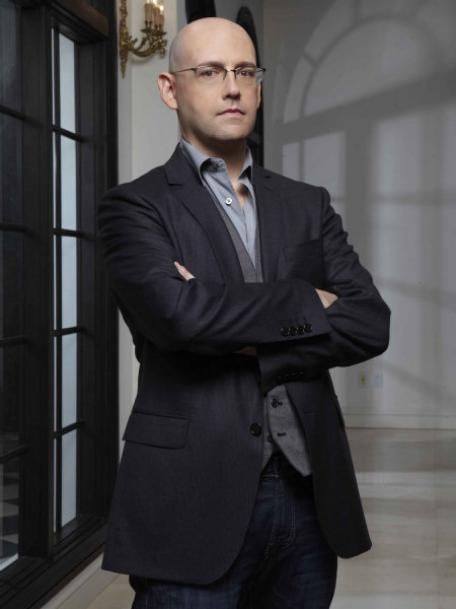Brad Meltzer is a writer whose nerd credibility stretches far, thanks to his work on comic book projects ranging from DC's Justice League murder mystery Identity Crisis to Dark Horse's Buffy the Vampire Slayer Season 8. But more and more, the novelist is becoming known among history geeks thanks to his television series Decoded, where he leads a team of historical researchers to uncover the truth of some of the world's biggest mysteries.
The show's second season just launched on History, with new episodes airing Wednesdays at 10 p.m. ET/PT. As the writer explained, the new season is able to shine a bigger spotlight on even bigger mysteries from across the United States and Europe.
"The difference in the second season is ... well, I could give a lot of smarty-pants answers, but really it comes down to realistic concerns," Meltzer told Spinoff. "There were ideas I pitched for the first season, and the honest truth was that we didn't have the budget for them. I pitched a story about Adolf Hitler and the Spear of Destiny for anybody who loves good, old-school Justice Society stories. Aside from being a JSA story, it really is true history. That wasn't made up from whole cloth. Adolf Hitler supposedly went after the Spear of Destiny – the blade that pierced Christ's side when he was up on the crucifix. The Vatican insisted it had the spear. Other people said they had it. Napoleon supposedly had it at one point, as did Constantine when he took power. So Hitler chased this thing because he thought it had power. I don't care if it has magic power or not – that's obviously nonsense. But if you tell me that Hitler wanted it, I want to know what it is.
"So I went to History during the first season and said, 'I want to tell this story.' They said, 'That's a great idea, but we don't know if this show is going to work. We can't give it the budget to send the entire team and the crew over to Europe.' So that alone affected how we did everything, but now that we're back for a second season, we have to budget to do it. We went over to Europe for almost a month to investigate these things."
The writer said that tonight's new installment also digs into a piece of the pop-culture zeitgeist, although not one with a comic-book connection. "This is one I pitched last year for Season 1 about the Declaration of Independence," he said. "If you go to the National Archives right now, the No. 1 question that is asked by tourists is, 'Is there really a secret treasure map on the back of the Declaration of Independence?' because of that National Treasure movie. Obviously, that's complete nonsense. It's a Nicolas Cage movie.
"But there really is something that's on the Declaration of Independence. It's a hand print, and nobody knows where it came from. That's a real story and a real mystery. We start with that and the theories that are out there. We can't go back and pull files on the founding fathers because there were no 'Ye Olde CSI Records,' but you get to see the people from the National Archives talk about what's there. And from that point, the episode takes off on every mystery surrounding the Declaration of Independence. It leads us to, to me, one of the great myths/mysteries of all American history, which is the Beale Treasure. This is one of the world famous treasure hunts where the guy used the letter so of the Declaration to hide his treasure. There are people who've spend lifetimes trying to crack this thing. People at the NSA use this to train codebreakers, yet it still remains uncracked. And we found a twist in it that I think is amazing and gets to the core of what this thing is all about."
Dividing his time between masterminding and hosting the show and writing thrillers like the just-released in paperback The Inner Circle means that Meltzer has a lot on his plate. Luckily, he's been able to play the two sides off each other. "I will be robbing from myself as much as I can," he laughed. "I started working on Decoded before I knew how Season 1 was going to do, but once we were done filming, I started to say 'I'm using that in the next book because it's so good.' I'm working on the sequel to The Inner Circle right now, so it's definitely in the same area and world."
And even though one set of his works is pure fiction and the other is reality TV, he said the truths found or engaged by all his projects inform readers ... even when his team can't find a definitive answer. "I'm very conscientious about that. The hard part when you have a show called Decoded is that you've made a promise to the viewer that they're going to get an answer. But the reality is, we're tackling the greatest mysteries of all history, so what are the odds that we'll be able to solve all of them? I think some of them we've come to real conclusions with. I think anyone who saw the D.B. Cooper episode in Season 1 saw a conclusion. It's amazing. When the new FBI person came out, I got a call the next night from my buddy who works at the FBI saying, 'They're still looking at your guy, but the other is not going to check out.' And sure enough, they still haven't disqualified our guy. I love that. We have an answer.
"If you watch the Statue of Liberty episode we did about the secret Satanic symbols in the Statue of Liberty, that sounds like a National Enquirer headline. But what we did on that episode was show everyone who's watching where that story began. Why did it start? We proved where it came from and why it became a part of the historical game of telephone.
"And I think there are going to be some episodes you can't do that on. I can't go out and physically dig John Wilkes Booth's body out of the ground. But I think that anyone who watches that episode gets to the end of it and says, 'We need to.' That's what our job is – to explore these things and give you all the evidence that's out there."
Ultimately, Meltzer considers Decoded a piece of journalism more so than entertainment. "I don't see the entertainment in it. I probably should, but we have to show the comparative side of these things. In our episode about Fort Knox this season, half our team said there's absolutely gold there. The other half said there's absolutely none. Anyone who says they know – unless they physically went in there – are all liars. I can go out there and declare 'There's no gold in Fort Knox' or 'John Wilkes Booth's grave is empty,' but unless I was there, I'd be a liar. It would be reckless of me to get out there and make those declarations. I never want to be that show. I want to be a show that's far more honest with its viewers."
At the core of his research lies a human element, he said: one of trust. "For me, I think whether it's in person or in a book or in the Library of Congress, the question is always the same: do you trust the person telling the story? I mean that about the person you're actually talking to but also when you're reading a book with the author who's telling you a story. The first work of research is to say, 'Just because someone says it, it doesn't mean it's true.' And my job when I write my novels is to try and figure out what true and share it with the reader. We do the same thing on the show, only the difference is that you see it all happen so you can decide for yourself. Do you believe the tinfoil hat-wearing nutjob, the guy who's a little more moderate or the guy whose face is blacked out and has dug a security moat around the outside of his house? Where do you think the rational person is?
"And if you ask 100 people, you'll get answers on every different side. What I'm fascinated by is that people will believe what they want to believe. It comes back to that moment in Identity Crisis where Superman says, 'We see what we want to see, and we hear what we want to hear.'"
Viewers can decide what they want to see, hear and believe tonight at 10 ET/PT on History. For more on Decoded, see CBR's interview with Meltzer on Season 1.


